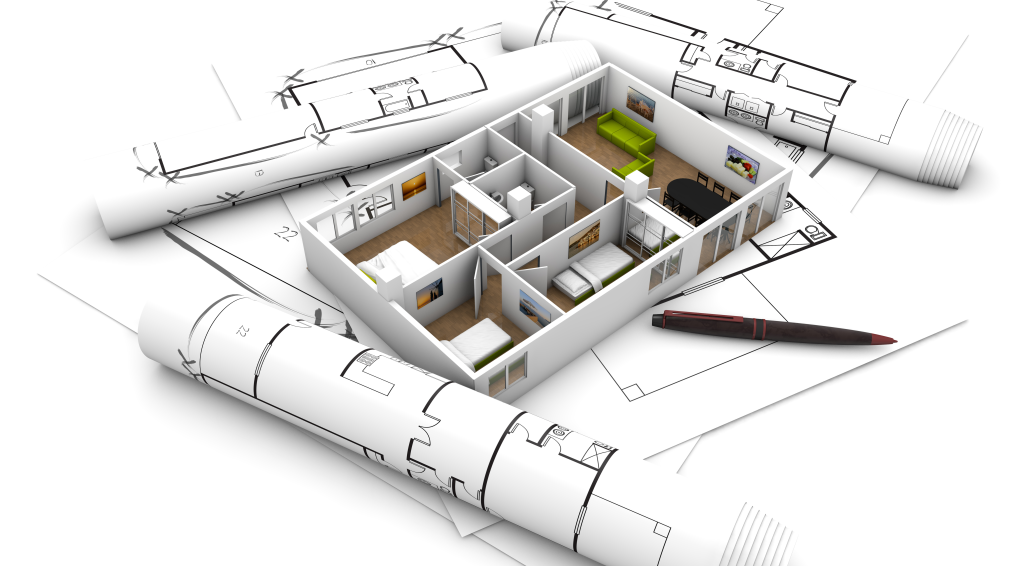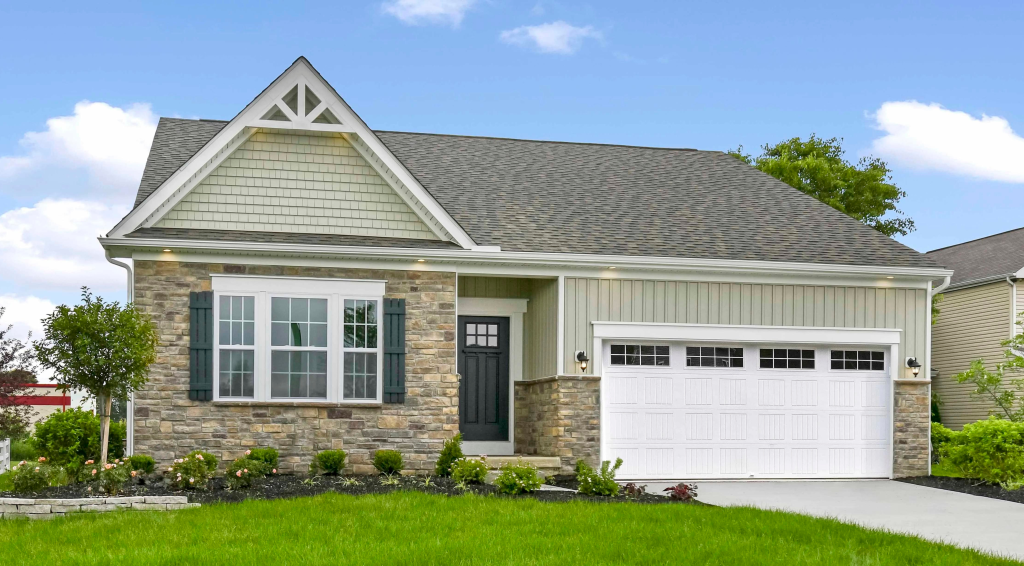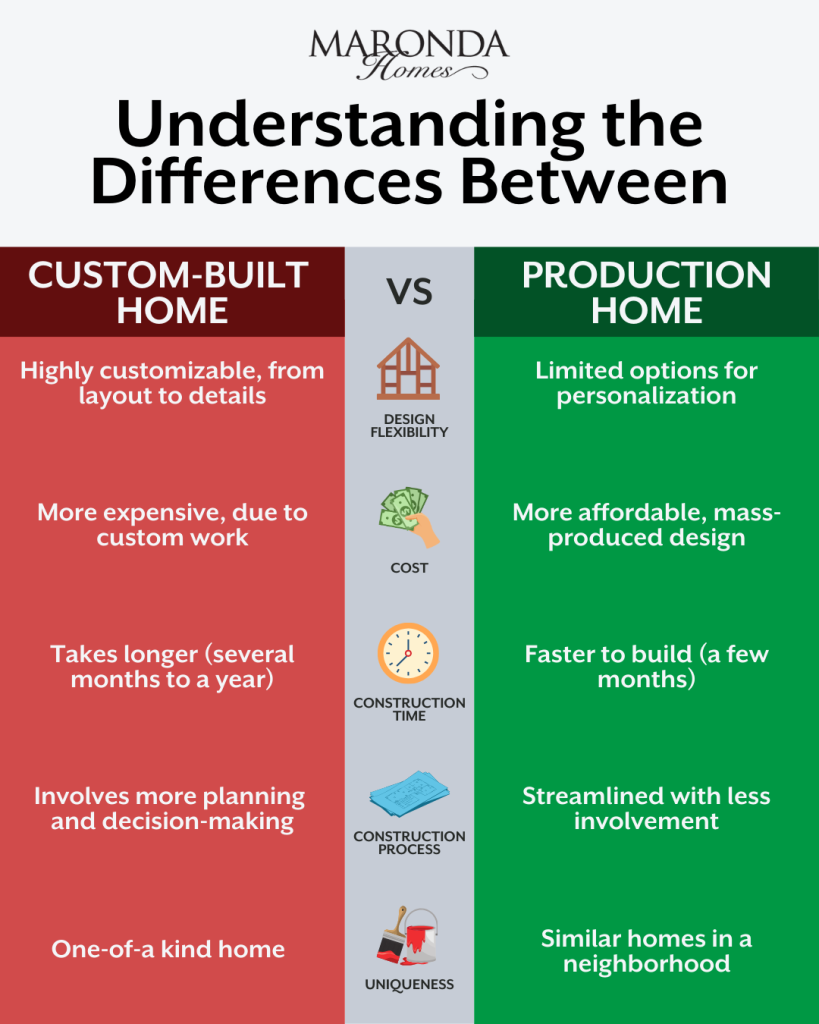Key Takeaways:
-
Personalization vs. Standardization: Custom-built homes offer extensive personalization, allowing you to tailor every aspect to your preferences. In contrast, production homes provide predefined options, streamlining the selection process.
-
Budget Considerations: Custom homes often come with a higher price tag due to unique designs and materials, whereas production homes benefit from economies of scale, making them more cost-effective.
-
Construction Timeline: Building a custom home typically requires more time for design and construction, while production homes follow a set schedule, leading to quicker completion.
-
Decision-Making Process: Opting for a custom home involves numerous decisions throughout the build, which can be overwhelming. Production homes simplify choices with curated design packages.
-
Resale Value: Custom features may cater to specific tastes, potentially impacting resale appeal. Production homes often align with broader market preferences, which can be advantageous when selling.
Choosing between a custom-built and production home can pose many questions and require different considerations. In this post, we’ll examine the differences between the two and weigh the benefits and setbacks of each type of build so that you can make the best decision based on your needs.
The main difference between custom-built homes and production homes lies in design, cost, construction process, and personalization. Here’s a breakdown of the differences:
Custom-Built Homes

Design and Personalization
You have control over the design and layout of your home. From the floor plan to materials and finishes, every aspect can be tailored to your preferences.
Unique Features
You can choose special features, such as custom cabinetry, unique architectural styles, or eco-friendly building materials.
Cost
Custom homes are generally more expensive due to the individualized design and materials. There can also be unexpected costs during the build process. The price can vary widely depending on design complexity, location, and chosen features.
Construction Time
Custom homes take longer to build, often several months or even over a year. This timeline includes designing the plans, obtaining permits, and construction. Learn more about typical construction timelines
Construction Process
You’ll work closely with architects, designers, and contractors to create the home of your dreams. It requires more hands-on involvement and decision-making.
Flexibility
There’s typically high flexibility in customization, so the home reflects your exact needs, desires, and lifestyle.
Production Homes

Design and Personalization
Production homes are built from pre-designed plans or models that are produced by builders. You can still choose certain aspects like paint colors, countertops, or flooring, but the overall structure is already set. There is less flexibility in terms of layout and design compared to custom-built homes. View Move-In Ready Homes
Cost
Production homes are generally more affordable because they’re mass-produced and based on standard designs. Builders benefit from economies of scale, reducing costs for buyers. The cost is generally fixed and easier to predict, with fewer unexpected expenses.
Construction Time
These homes are quicker to build—often within a few months—since the design, materials, and processes are already streamlined. It’s faster to move in as homes are typically built in phases (often in neighborhoods with similar homes).
Construction Process
The process is less complex, with a builder managing most of the details. While you can make some choices, you don’t have to worry as much about overseeing the project.
There is less hands-on involvement, so it’s a simpler, more straightforward process with less decisions to be made.
Flexibility
You have fewer choices in terms of design, layout, and features. These homes are designed to appeal to a wide range of buyers but are not as personalized or unique as custom homes.
Key Differences

Now, let’s recap the pros and cons of each type of home:
Custom-Built Homes
Pros:
- Tailored to Your Needs: You have full control over the design, layout, materials, and features. It’s your dream home, built exactly how you envision it.
- Unique Style: Custom homes are one-of-a-kind, offering a sense of individuality and exclusivity.
- Flexibility: You can adjust aspects like energy efficiency, smart home features, and sustainability according to your values and needs.
Cons:
- Cost: Custom homes tend to be more expensive, both for construction and design. You’ll be paying for customization, and unexpected costs can arise.
- Time-Consuming: The design and build process can take several months (or even years). It may also involve more back-and-forth with contractors, architects, and designers.
- Stress: Managing a custom build requires a lot of decision-making, oversight, and coordination. If you’re not hands-on, you may feel overwhelmed.
Production Homes
Pros:
- Faster to Build: Production homes are typically quicker to construct because they are based on pre-designed plans and often use standardized materials.
- Predictable Costs: The price is usually fixed, and there are fewer unexpected expenses compared to custom builds.
- Lower Maintenance Costs: Production homes are often built using well-established methods, which can make maintenance more predictable and affordable.
- Availability of Model Homes: You can tour existing homes to see exactly what you’re getting before making your decision.
Cons:
- Less Personalization: You’re limited to a set number of designs, features, and layouts. There may be fewer options to personalize the home.
- Cookie-Cutter: Many production homes in a community look alike, which can feel less unique.
- Less Flexibility in Design: You might not get the exact layout or features you want, unless you’re willing to make compromises.
Considerations to Think About:
- Budget: Can you afford a custom home, or do you prefer something more budget-friendly?
- Timeline: How soon do you want to move in? A production home can be quicker to settle into.
- Long-Term Plans: Are you planning to stay in your home for a long time? A custom home might be more appealing if you’re creating a forever home.
- Location: Does the builder of the production home offer good locations, or does the custom home option give you a better chance of finding your ideal spot?
